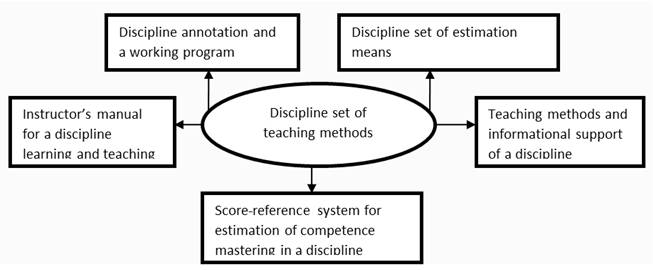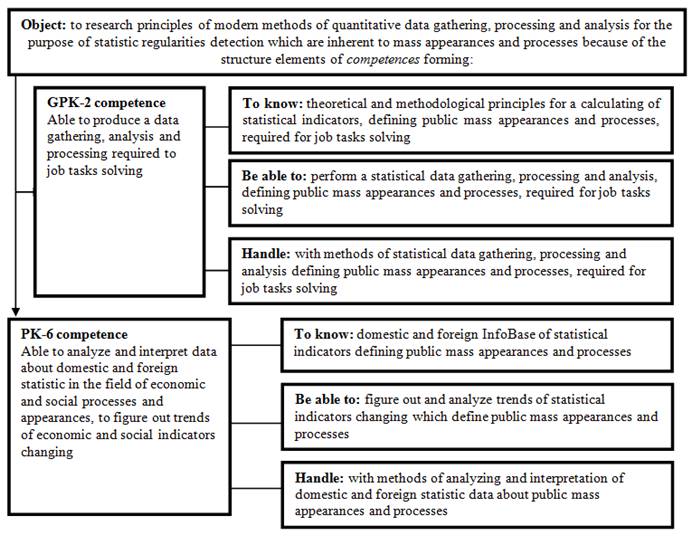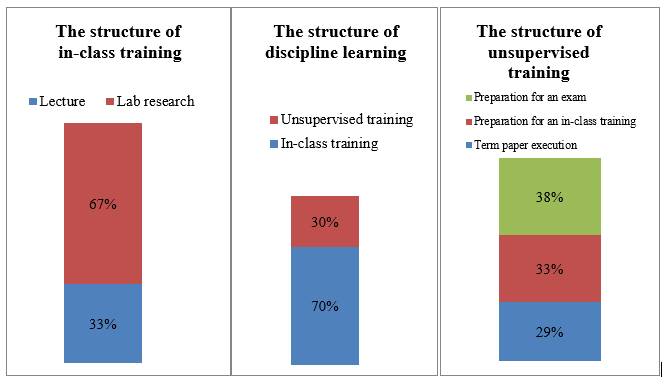Abstract
In the present paper, a process of forming of student's professional competences during the «General theory of statistic» learning is considered in the form of a management system with a formal description of its elements and connections. Today when a sphere of higher education is subjected to particular transformations. Educational standards are changed, competent approach and interactive learning forms which demand the unification of learning activity and estimation procedures are implemented the system approach actuality for an educational process organization of higher educational establishment is confirmed with modern reality. Through the implementation such methods of scientific research as analysis and synthesis as well as modelling and analogies there was confirmed a principled possibility for a forming of student's professional competences during the «General theory of statistic» learning in frames of the system approach, its workability was also confirmed. The article deals with the experience of forming students' competencies in connection with changes in educational standards.
Keywords: Disciplineprofessional competence
Introduction
The system approach is a branch of a scientific cognition methodology where the object is considered as a system, i.e., a complex of communications relation. Such an approach is used in all processes where it is possible to mark out an object and a subject of the management as well as direct and reverse communications between them. In that case, the process of competence mastering by a student during the learning of any discipline in the higher educational establishment (including the General theory of statistic) can be observed from the position of the system approach (Figure

Marked system elements: manageable subsystem (student – the object of management), managing subsystem (professor – the subject of management) as well as direct (learning activity) and reverse (estimation procedures) connections between them form the whole system of process organization for competence mastering by a student during the General theory of statistic learning which is in this paper in detail considered.
Problem Statement
The upcoming transformation of educational activities is carried out in accordance with the requirements of new educational standards. Therefore, it is necessary to take preventive measures to increase the universality and adaptability of educational and assessment procedures in academic disciplines, in particular, the general theory of statistics. Such measures allow, among other things, bringing the discipline to a new interactive level, facilitate the implementation of distance learning technologies. As a result, the quality of training bachelors will increase, and the depth of their professional competence will develop. This result can be achieved by presenting the organization of the process of mastering the student competencies when studying the general theory of statistics from the standpoint of a systems approach (Shilova, 2017).
Research Questions
System views of the student competences process formation in the study of the General theory of statistics need to identify and to describe in detail the direct and inverse relations between the elements of such a management system. That is, the issue is considering the organization of the classroom and independent work, contra current and interim assessment of students during the discipline learning.
Purpose of the Study
The article aimed to the identification and describing the direct and feedback elements of the students' professional competence system formation, to scientifically substantiating the principal possibility of professional competences formation by students while studying the discipline "General theory of statistics" with the system approach.
Research Methods
Representation of the professional competencies formation process by a student in the study of the General theory of statistics as a management system is possible using universal scientific methods of modelling and analogies, analysis and synthesis.
Findings
The system organization of in-class and unsupervised training of a student during the «General theory of statistic» learning
A teaching of the «General theory of statistic» discipline (hereinafter a discipline) in FGBOU VO «PGU» is regulated by the set of teaching methods which was developed by the higher educational establishment and placed in the electronic-information educational media according to FGOS VO in the field of training 38.03.01 «Economics». This set represents a system of normative documents regulating learning activity and estimated procedures about a discipline (Figure
The discipline provides a Bachelor of Economics with general skills, analytical and also research training. This discipline is a basic part of mandatory curriculum disciplines, and it is necessary for a forming of general professional (GPC-2) and professional (PC-6) competencies defined by FGOS VO (Figure


The labour intensity of the discipline learning activity is 5 credits or 180 hours, including in-class training – 54 hours and unsupervised training – 126 hours (Table
A student's in-class training is supposed to consist of lectures and lab researches. Discipline lectures act as methodological function giving a school for lab researches. Lab researches consolidate student's knowledge received during lectures. A student's unsupervised training is supposed to consist of a term paper execution, a preparation for in-class training and exam.
A term
Every student does his project individually. The project assumes the performance of calculation and analytical procedures and then making up an explanation note based on its results. During the interview, a professor asks a qualifying question about calculations, conclusions and recommendations given by a student in his explanation note for a project. Questions submitted to the discussion correspond to estimation positions of the term paper.

A student's preparation for an
During the lab research on every single theme of the discipline, a student makes thematic tests using the computer system «Ellekta», which was developed by FGBOU VO «PGU» and placed in university electronic-information educational media (Koshevoi, 2005; Koshevoi et al., 2019). A goal of the thematic testing is to train a student for a final test in a control point as well as for an exam.
A student's training for an exam is supposed to consist of training for a final test. A student should work out lecture materials. The study recommended methodological and periodical literature; make an Internet-resources search.
A student submits the results of his unsupervised training on in-class training, where a professor estimates it during the current check and intermediate inspection according to a score-reference system adopted in FGBOU VO «PGU».
A system organization of the current check and intermediate inspection of a student during the «General theory of statistic» learning
A level of the competence mastering process by a student during the discipline learning is controlled by a professor in frames of estimation procedures of current check and intermediate inspection using estimation means system (Galkin et al., 2018).
Current check is performed in the form of control points setting through estimation of calculation and graphic works, a defence of work results by an interview, thematic tests making and also based on student's in-class training attendance.
Using 100-score estimation scale, a student got up to 1 score for every single complete calculation and graphic work and passed interview (Table
Using 100-score estimation scale a student's in-class training attendance is estimated as 0,5 score. A student's absence because of reasonable excuse is considered as a conditional presence
Using 100-score estimation scale, a student gets one score for every correct made thematic test task. The quantity of such tasks which are given to a student in a control point (T) is calculated as follows:
T = MAX – (1×ГР + 1×С + 0,5×K),
where:
MAX – maximum score quantity able to be received by a student in a control point;
ГР – a quantity of made an estimated calculation and graphic works before the control point;
C – a quantity of passed interviews based on calculation and graphic works results before the control point;
K – a quantity of in-class pieces of training before the control point. The intermediate inspection is realized in the form of an exam and a term paper.
The exam in the form of the final test using a computer system «Ellekta» takes place in a computer class. A student is supposed to make 40 test tasks which are randomly taken out from a fund of thematic test fund. Using 100-score estimation scale, a student gets one score for every correct made thematic test task. The final test is supposed to be passed when a student gets not less than 24 scores.
A discipline term paper is supposed to consist of project preparation and interview based on its main sections (Table
At an average by estimation positions of a term paper, a student should get 24 scores.
Therefore, during the intermediate inspection, the student's rating, which was formed according to the score-reference system, is summed up. Then using an estimation scale, adopted in FGBOU VO «PGU», a student is received a total score and also exam and term paper score (Table
For the discipline mastering the higher educational establishment has modern material and technical basis which provides practical, analytical and research work of a student assuming one personal computer with Internet per 2–3 students. A presence of multimedia equipment (projector, multimedia lecture hall) and licensed software (PC MSExcel, MSOffice, PowerPoint, Ellekta) (Lyubimtseva, 2017) is compulsory.
Conclusion
In this paper, the ability of process organization of student's competence mastering during the general theory of statistic learning was scientifically proved from the system approach position. Elements and connections composed such a system was described in detail. In a further, it will help to FGBOU VO «PGU» to automate a learning activity and estimation procedures during the discipline learning, to bring it on a new interactive level, to increase the communication speed between a student and a professor, to improve a quality of a bachelor training through the increase of the competence mastering level (Chukhacheva, 2019). Besides, this system description of the competence mastering process is characterized by an absolute generality. Therefore, the described in the paper general learning and estimation processes could be implemented in the educational system of any discipline in a higher educational establishment. It is also important to note that the process of competence mastering by a student during the «General theory of statistic» learning is positioned like a managing system, so later during the transition to a new educational standard it would make the structure reformatting of the discipline easier.
References
- Chukhacheva, E. V. (2019). Fund of evaluation tools as an innovative technique of formation of control and evaluation components of professional readiness in future teachers. Personality in a changing world: health, adaptation, development, book 7, no. 3 (pp. 479–490). Ryazan: Publ. house Ryazan state medical Univer. named after acad. I. P. Pavlov.
- Dobrynyna, I. V., & Trusova, J. N. (2017). Forming of essential means fund for an intermediate inspection of students learning the “The probability theory and mathematical statistics” discipline. Improving the organizational and methodological work of the university to improve the quality of training in higher education programs. Mater. of the XLIV Ed. and methodol. Conf. of teaching staff, postgraduates, undergraduates, and applicants of Tolstoy TSPU (pp. 125–128). eLIBRARY ID: 29726162
- Efremova, N. F. (2015). The principles of independent evaluation system in higher education. Higher ed. in Russ., 7, 63–67. Publ. Moscow Polytech. Univer. eLIBRARY ID: 29461341
- Galkin, V. M., Erofeeva, L. N., & Lescheva, C. V. (2018). Mathematical statistics: the increase of student’s interest to the discipline and new teaching trends. Innovation technologies in the educational sphere. Mater. of All-Russ. Methodol. conf. (pp. 56–58). Nizhny Novgorod State techn. Univer. named by R. E. Alexeev. eLIBRARY ID: 32589830
- Koshevoi, O. S. (2005). The usage of the system analysis during the diagnosis of the management activity problems. Higher ed. establishment’s news. Volga region. Soft sci. Theor. and pract. J., 3(18). Inform.-publ. center of PGU.
- Koshevoi, O. S., Nekrilova, N. V., & Khokhlova, I. G. (2019). Example of forming feedback in the university educational environment system. Sustainable development: Society, Ecology, Economy. Mater. of the XV Int. sci. conf. In 4 parts, ed. by A. V. Semenov and N. G. Malyshev. (pp. 112–119). Publ. house Witte Moscow Univer.
- Lavrentiev, G. V., & Lavrentieva, N. B. (2018). Methodological analysis of the system and complex approaches in the teaching. Actual problems and perspectives of the modern education theory and practice. Select. Pedag. works based on mater. of the int. theor. and pract. conf. (pp. 154–158). Gorno-Altaysk: Gorno-Altaysk State univer. eLIBRARY ID: 35027628.
- Lyubimtseva. (2017). Organization of independent work of students in the framework of studying the discipline “Mathematical statistics”. Research: theory, methodology and practice. Coll. of mater. of the Int. sci. and pract. conf. (pp. 132–134). Cheboksary: Publ. limited liability Company center for sci. cooperat. “Interactive plus”. eLIBRARY ID: 29288574
- Shilova, Z. V. (2017). The usage of information technologies during the learning “The probability theory and mathematical statistics” discipline. Advan. Sci., 4, 74. Vyatka State univer. eLIBRARY ID: 32314523
Copyright information

This work is licensed under a Creative Commons Attribution-NonCommercial-NoDerivatives 4.0 International License.
About this article
Publication Date
27 February 2021
Article Doi
eBook ISBN
978-1-80296-101-0
Publisher
European Publisher
Volume
102
Print ISBN (optional)
-
Edition Number
1st Edition
Pages
1-1235
Subjects
National interest, national identity, national security, public organizations, linguocultural identity, linguistic worldview
Cite this article as:
Koshevoi, O. S., Nekrylova, N. V., Khokhlova, I., & Roganov, V. R. (2021). Systematic Approach And Student Competencies Formation When Studying Statistics. In I. Savchenko (Ed.), National Interest, National Identity and National Security, vol 102. European Proceedings of Social and Behavioural Sciences (pp. 797-805). European Publisher. https://doi.org/10.15405/epsbs.2021.02.02.100

